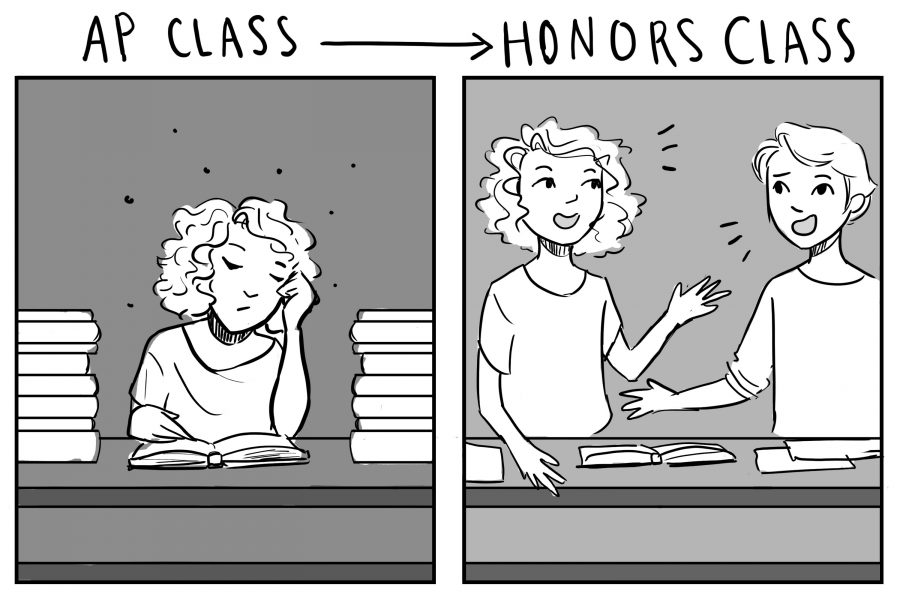Los Altos Should Abandon the AP Program
The MVLA School District has been a devout follower of the AP system since its inception. In 1971, the district offered four AP courses. Today, the district offers 31 of the 35 courses created by College Board. AP enrollment is on the uptick, in alignment with the district’s efforts, and last year, 83 percent of the 3177 AP exams taken at MVLA achieved at least a passing score.
School board discussions focus on increasing AP access to all demographics and getting rid of any sub-three scores, and the focus on AP has been a driving factor in many of the administration’s actions. High AP enrollment and achievement plays a key role in determining different public school rankings, specifically Newsweek’s yearly public school rankings, in which AP enrollment makes up 17.5 percent of the weighting scheme.
Yet while the district champions AP achievement as the pinnacle of academic success, there’s increasing dialogue centered around freshman college readiness, and specifically, the lack thereof. AP enrollment has been increasing nationwide, yet recent 12th grade assessments done by the National Assessment of Educational Progress show decreases in both reading and math preparedness.
Pushing away from decades-worth of AP-centric focus isn’t easy, but for schools with the resources like MVLA, it’s necessary. The AP curriculum forces teachers to teach to the test, and it limit teachers’ ability to create meaningful content in favor of compressed schedules short on time and fueled by a single assessment. When asking how high schools should best prepare students for college and beyond, the AP program fails to meet the necessary criteria.
Abolishing APs wouldn’t mean ridding the school of rigorous courses, but rather replacing them with another set of the same subjects now titled as Honors courses. These courses would be of similar difficulty, teaching the same subject, but without the AP label.
In 2011, Crystal Springs Uplands School in Hillsborough decided to take this route when several teachers approached their administration to ask if they could deviate from prescribed AP curriculum. Over the course of the 2010-2011 school year, the teachers led what Assistant Head of School Christy Dillon called a grassroots movement to rethink the AP program.
Eventually, the team of academic department heads convened by Dillon found that, yes, the AP course system restrained teachers from performing at their best to prepare students for the future.
“All courses… should reflect the mission of your school, and prepare this generation of students for college and beyond,” Dillon said. “Does the AP program achieve one or both of these goals? In the end, we decided that it does not. We realized that in the hands of our talented teachers with deep knowledge and passion for their discipline, we could do much much better.”
The following year, all AP courses at Crystal Springs were replaced with Honors/Advanced Topics (AT) courses with the same teachers and subjects, although students could still register for AP tests of their choice.
Over the summer, teachers at Crystal Springs began to think about designing their optimal class without the restraints of the AP. The end result brought a pivot toward project-based learning models: the curriculum for US History Honors became completely project-based, and Physics C turned into an Engineering & Tech Honors class that contained similar concepts but applied them to an engineering background.
With the AP test looming overhead, these hands-on approaches to education simply can’t happen. The exam forces teachers to finish course material before AP test dates in early May, emphasizing detailed memorization. Moreover, teachers lose a precious two-week chunk of time for teaching, and even more for curricula that spend large portions of the spring semester solely reviewing for the AP.
Without the AP, Dillon noted that the rigor of classes did not drop. Students faced equal, if not greater, challenges in Honors courses, whose diminished focus on content and memorization also increased focus on students’ analytical skills.
The shift in attention is the next step in modernizing education, and it’s what new assessments like the SBAC and new SAT try to prioritize. With all course subject material available readily online, students need to learn to synthesize and analyze unfamiliar information, and teachers ought to abandon the lectern for more discussions and projects.
Evidence shows that project-based learning improves students’ abilities to answer open-ended questions. In a study conducted by professors Fengtian He and Jiqin Lian at the Third Military Medical University, students who were taught biochemistry on a lecture-based learning program scored an average of 60.75 percent on their short-essay examination, while students taught under the project-based learning program scored a much higher 80.5 percent. Furthermore, studies have shown that project-based learning increases student engagement and motivation.
While courses will still cover content, teachers will also have the opportunity to dive deeper into chosen topics without worrying about having to cover an expansive content base. Evidence suggests that going for depth over breadth of information provides more benefits for students. A study of 8,310 students conducted by associate professor Tai at the University of Virginia found that mastering a particular topic in a subject impacted students twice as much as covering every major topic in that subject.
In terms of college-readiness, Dillon reported many students complained that Crystal Spring’s previous AP program didn’t prepare them for their college courses. The main issue, coming from the students, was that they didn’t know how to apply the content they were learning to college classrooms’ focus on real world applications.
“The teacher discovered he wasn’t teaching students to think like scientists because we taught sort of the canned labs and terms that kids memorized,” Dillon said. “These kids head off to college, and the college professors are talking about real world problems that scientists are trying to solve. Kids came back and said we weren’t giving them the preparation for that.”
Today, Crystal Springs holds the 21st spot on Niche’s “2016 Best Private High Schools in America,” a significant increase from its 78th spot in 2012. Worries over college acceptance rates and college credit never precipitated into reality; college admission officers recognized Honors courses for their challenging coursework just as much as any AP tests, and students still took their favored AP tests.
Abandoning the AP system requires faith in the commitment of our teachers and the support of the community, but it can be done. If the district establishes a rigorous set of criteria that enforces critical thinking and creativity in the classroom, the implementation of a new Honors-only course system would provide the necessary skills for college and beyond.





Mr. Barker | Nov 30, 2016 at 10:41 am
Important food for thought. The questions surrounding how courses comply with a school’s real mission and vision need to be answered. As indicated, there are practical as well as philosophical questions to consider. As an AP Lit teacher, I don’t feel quite as hamstrung as some might in other disciplines. Nonetheless, the ability and willingness to question the assumptions and status quo paradigm around standardized testing and preparation for that testing strikes at the heart of deeper issues around the current state of education, especially as regards its continued lagging in terms of progressive changes to the look, feel, and intentions of the “modern” classroom and pedagogy, both of which have changed in far less dramatic ways than seen in other fields.